The dangerous trade-offs between food and other essentials

By Raise Your Voice Saint Lucia Inc
CASTRIES, St Lucia – Every day, poor families and individuals are forced to make dangerous trade-offs between food, health care, education, housing and other essentials. Food insecurity is often a proxy for economic insecurity and inequality.
Rates of food insecurity are higher for households with incomes near or below the national poverty line, with women and men living alone, and with children, especially households headed by a single parent. Rates are also higher in already marginalized and vulnerable homes and communities. These groups can be especially vulnerable to poor nutrition and diet-related diseases due to intersecting risk factors associated with inadequate financial resources for individuals and their families.
In addition to income, the food environment plays an important role in people’s access to food. And hunger is not just about getting enough calories to relieve an empty stomach; the nutritional quality of the food matters too. Many communities—especially those with high populations of low-income people, face substantial challenges in accessing healthy and nutritious foods, including poverty, lack of access to transportation, lack of healthy food retail, and greater access to unhealthy food sources like foods high in starch and carbohydrates and easy access to alcohol outlets.
These circumstances are largely due to chronic underinvestment in many rural communities over the past 50 years which have contributed to disproportionate rates of diabetes, heart disease, and hypertension – comorbidities that make people more vulnerable to COVID-19. Although data on testing, hospitalizations, and deaths due to COVID-19 are still incomplete, early warnings and reports have shown that low-income, communities have been hit the hardest. Many in these groups are frontline and essential workers who are put at risk when they use public transportation or go to work. Many also live-in homes with many people, where a working-age adult exposed to the virus could pass it on to seniors and others in their household.
Furthermore, these households are not only more likely to be exposed to the disease but are more vulnerable to it due to longstanding environmental inequities, where exposure to toxic and obesity-promoting elements in their daily environments cause higher rates of asthma and diet-related chronic diseases. They have less access to adequate health care and testing, limited safety net protections, and many of them are among the hundreds of service workers who have already lost incomes and jobs due to COVID-19.
Prevalence of food insecurity is especially high in communities such as Anse La Raye, Canaries, Soufriere, Dennery, Micoud and Vieux Fort, where there are large populations of unemployed and low-income residents.
For the month of September, we packaged and distributed over 300 parcels of food, each food parcel is valued at US$110, on average we spend a total of US$1,500 per month to assist those who are food insecure across the island, including our gender-based violence clients.
It is imperative that we continue to support those who are in need of food but so too must central government.
Source: caribbeannewsglobal.com



